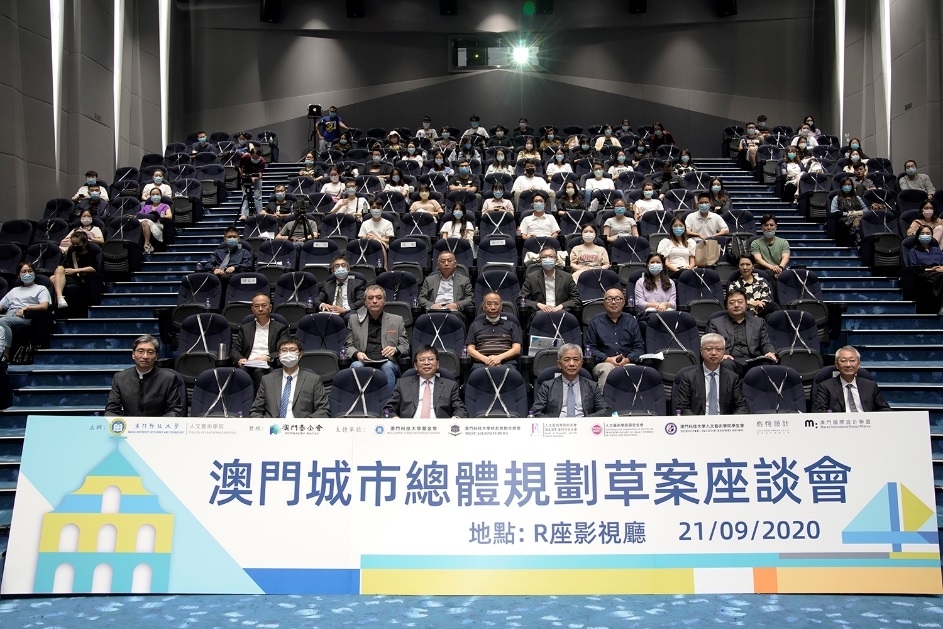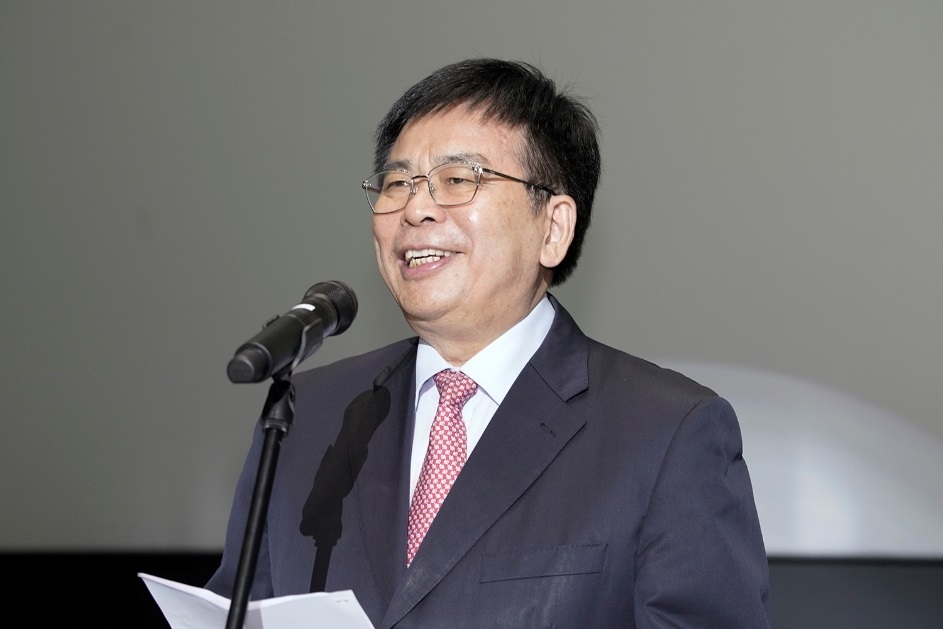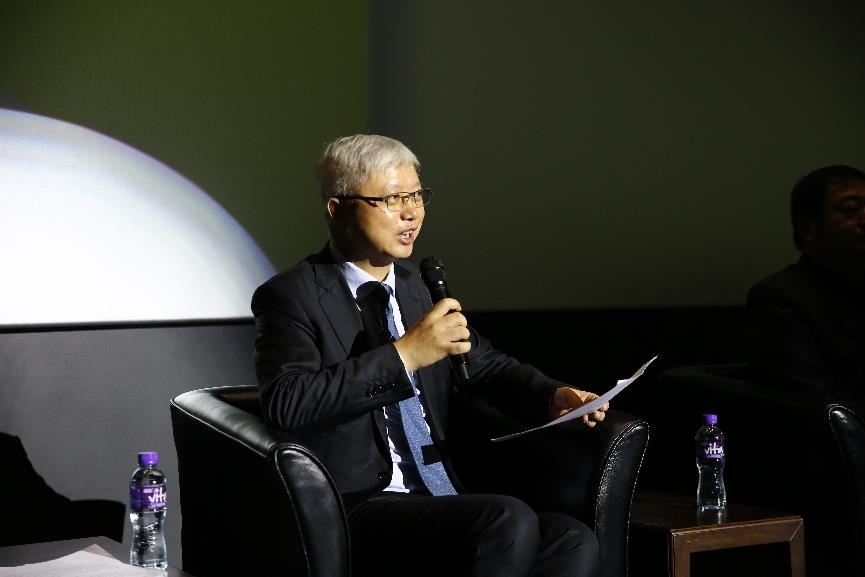M.U.S.T FA Holds “Symposium on the Proposal of Macao’s Urban Master Plan” and
Discusses Urban Planning with Scholars from the Greater Bay Area
Faculty of Humanities and Arts of Macau University of Science and Technology held the “Symposium on the Proposal of Macao’s Urban Master Plan” at 10 AM on September 21, 2020 in the Film and Television Hall of Block R Academic Complex. Professor Meng Jianmin, an academician of the Chinese Academy of Engineering and well-known architect, served as the academic convenor of this symposium and invited distinguished guests such as the following: Professor Song Ding, Director of Tourism and Real Estate Research Center of China (Shenzhen) Comprehensive Development Research Institute, National High-end Think Tank; Professor Rao Xiaojun, School of Architecture and Urban Planning, Shenzhen University; Senior Engineer Tang Dawei, Dean of Shenzhen Institute of Architectural Design and Research Co., Ltd.; Lo Chi Kin, Vice Chairman of the Municipal Management Committee of the Macau Municipal Administration; Dr. Lam Kam Seng, Chairman of the Board of Directors of Macau Urban Renewal Co., Ltd.; Carlos Alberto dos Santos Marreiros, Chairman of the Senior Committee of the Macau Institute of Architects; Architect Leong Chong In, Chairman of Macau Institute of Architect. Notable staff members of M.U.S.T include: Chair Prof. Liu Liang, President, Academician of Chinese Academy of Sciences; Prof. Pang Chuan, Vice President; Prof. Lin Guangzhi, Director of Institute for Social and Cultural Research; Prof. Liu Chengkun, Director of The Institute for Sustainable Development; Prof. Zhang Zhiqing, Dean of Faculty of Humanities and Arts; Dr. Samantha Chiang, Vice Dean of Faculty of Humanities and Arts; Distinguished Professor Ung Vai Meng; Assistant Professor Zheng Jianyi, Course Coordinator of Architecture. The symposium was presided over by Vice President Pang Chuan.

Group photo

Speech by President Liu Liang
In his speech, President Liu Liang stated that in the face of the opportunities and challenges of the construction and development of the Guangdong-Hong Kong-Macao Greater Bay Area, the preparation of an overall urban plan for Macao will play a agenda-setting role in the future development of Macao. This symposium was held in the context of the 20th anniversary of the establishment of M.U.S.T. and the first enrollment of the Master and Ph.D. programs of Architecture of the Faculty of Humanities and Arts. It covered topics and perspectives from master planning to tourism and cultural creation, heritage protection and smart city, offered analyses on the problems in the course of development of urban architecture in Macao, and shared the leading trends of urban planning in the Greater Bay Area. The talks would provide multi-angle thinking and suggestions for the improvement of the Macao’s Urban Planning Proposal. Macao, with its blend of Chinese and Western cultures as well as rich and colorful world cultural heritages, has achieved great success in its implementation of "One Country, Two Systems" since returning to the motherland. Macao is a small but beautiful and richly endowed city, with limited space but huge potentials. M.U.S.T has the responsibility and conditions to offer its multidisciplinary advantages to provide academic support for the sustainable development of Macao, the improvement of the living environment and the quality of the tourism environment etc., and contribute academically to the new practice of "One Country, Two Systems" and the long-term prosperity and stability of Macao.

President Liu Liang presented to Academician Meng Jianmin the Certificate of Appointment as a distinguished professor of M.U.S.T
At the Symposium, President Liu presented Certificate of Appointment to Academician Meng Jianmin of the Chinese Academy of Engineering, who, starting from September 2020 has become a distinguished professor of M.U.S.T. . Joining the University as a distinguished professor, Academician Meng will greatly promote the development of relevant majorsat M.U.S.T, and better the University’s provisions at cultivation of talents and services to the Macao society. At present, the graduate program of architecture of Faculty of Humanities and Arts of M.U.S.T has formed a faculty team including Academician Meng Jianmin of the Chinese Academy of Engineering and Academician Wu Shuoxian of the Chinese Academy of Sciences, aiming to gather well-known experts and scholars in related fields around the world to cultivate more high-end talents in the field of architectural design for the urban development of the Guangdong-Hong Kong-Macao Greater Bay Area.
In his speech, Academician Meng Jianmin thanked M.U.S.T for his appointment, saying that he would give full play to his scientific research advantages in the field of domestic architecture and urban planning, and invite more experts and young scholars to participate in the curriculum building of architecture and joint academic research of M.U.S.T, with unique features that connect to the international community. He hoped to cultivate high-level talents to serve the Macao society.
At the symposium, Academician Meng Jianmin first affirmed the important leading role of a master plan in urban development. However, plans don’t always get implemented in accordance with the intentions of their planners because cities possess the feature of spontaneity. Especially in Macao, the urban development has been dominated by its spontaneity for a long time. Besides, Academician Meng put forward optimization suggestions on the connection of the new master plan with the existing urban development rules in Macao. The master plan should not be confined to the summary of the past experiences or only focus on the current problems; instead, it should be bolder and more forward-looking. As the urban master plan takes a time span of 20 years and the change of times is unpredictable, it is necessary to reserve flexibility and resilience for the urban development. The significant task of the master plan is to define the boundary of flexibility and resilience reasonably.

“Symposium on the Proposal of Macao’s Urban Master Plan” was hosted by Vice President Pang Chuan
From national and international perspectives, Prof. Song Ding pointed out that Macao’s master plan should reflect Macao’s future leadership in the world. Prof. Rao Xiaojun focused on the research of heritage conservation from multi-dimensional aspects, indicating that organic cities could not maintain the vitality of community cultures with only one master plan. From the perspectives of promoting prefabricated buildings and industrialization, Tang Dawei, a senior engineer, proposed that relevant directions should be mentioned in the master plan and some industries could take advantage of the manufacturing bases in the west coast of the Greater Bay Area. In addition, the architect Carlos Marreiros affirmed the important role of the master plan in the future development of Macao. He also thought that the regional division was beneficial to the urban development, and the detailed regional division planning should provide more participation opportunities for local architects, because local architects were more familiar with the community situations, more conducive to the further research, and more suitable to the local atmosphere. Meanwhile, he stated that Ponte Governador Nobre de Carvalho had the potential to be protected and revitalized as the new green landscape corridor of Macao, which could increase the public leisure green space and become a new landmark with the 360-degree view of the city.
In the exchanges at the symposium, different scholars from M.U.S.T expressed their opinions based on their own teaching and research experiences. Distinguished Professor Ung Vai Meng pointed out that the history, culture and natural environment of Macao should be respected; urban spatial resources should be regulated to achieve the strategic goal of complementing each other; rich historical and cultural memories of Macao should be preserved by naming the districts prudently. Assistant Professor Zheng Jianyi put forward optimization suggestions in terms of the science and technology axis of knowledge industry. He hoped that the axis would combine the Light Rapid Transit line and the Taipa line to connect various districts, so that District A, the university district, the business district and the industrial district could truly become the spatial core of Macao’s future development and be connected with the Greater Bay Area. At the same time, with regard to the feasibility of the master plan, he also explained the quantitative analysis technology of landscape sight and vision, management of historical urban landscape (HUL) recommended by UNESCO, the core index of multi-planning integration, etc., in the hope of providing some inspirations for the scientific and regional features of the master plan. Prof. Lin Guangzhi stated that the master plan should have a comprehensive understanding of Macao’s current situations, such as the distribution of primary and secondary education facilities and medical facilities in the urban areas, so as to respond to the concerns of the public. From the perspective of urban economics, Prof. Liu Chengkun proposed the economic factors and dynamic mechanism behind the plan. As the development of space could not be separated from the support of spatial economics, the master plan should conduct more detailed data analyses in this respect.
The proposal of “Macao’s Urban Master Plan (2020-2040)” started its public consultation on September 4th. This is the first urban master plan by the government of the Macao S.A.R during the 20 years since its return to the motherland and 15 years after its being enlisted in the World Heritage List. It is also the first urban master plan covering the whole areas of Macao in its history of more than 450 years.





